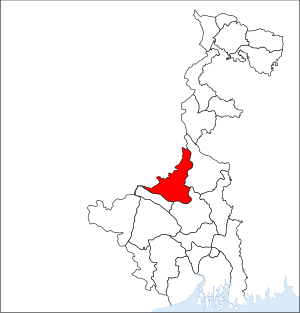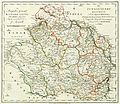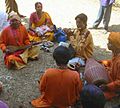Birbhum district facts for kids
Quick facts for kids
Birbhum district
|
|
|---|---|

Location of Birbhum district in West Bengal
|
|
| Country | India |
| State | West Bengal |
| Division | Burdwan |
| Area | |
| • Total | 4,545 km2 (1,755 sq mi) |
| Population
(2011)
|
|
| • Total | 3,502,404 |
| • Density | 770.61/km2 (1,995.86/sq mi) |
| • Urban | 449,448 |
| Demographics | |
| • Literacy | 70.68 |
| • Sex ratio | 956 |
| Time zone | UTC+05:30 (IST) |
Birbhum district is a special area in West Bengal, India. It's known for its unique red soil and rich history. This district is an important part of the state's administration and culture.
Contents
History of Birbhum
Birbhum became an official district in 1787, when India was under British rule. Before that, it was part of the Murshidabad district. After India became independent in 1947, Birbhum continued to be an important administrative area in West Bengal.
How Birbhum is Governed
Birbhum is the most northern district in the Burdwan division of West Bengal. The main office, or 'headquarters,' for the district is in a city called Suri. Other important cities here include Rampurhat, Bolpur, and Sainthia. On its western side, Birbhum shares borders with districts from the state of Jharkhand. To the east, north, and south, it borders other districts within West Bengal, like Bardhaman and Murshidabad.
Geography and Landscape
Birbhum is often called "the land of red soil" because of its unique ground. Its landscape and culture are a bit different from other parts of West Bengal. The western part of Birbhum has many bushes and is part of the Chhota Nagpur Plateau. This bushy area slowly changes into fertile farmlands in the east.
Culture and Traditions
This district has been home to many important cultural and religious movements throughout history. The famous Visva Bharati University in Santiniketan, started by the Nobel Prize winner Rabindranath Tagore, is one of the places Birbhum is known for. Many festivals are celebrated here, including the lively Poush Mela.
Industries and Economy
Birbhum is mainly an agricultural district. About 75% of the people here depend on farming for their living. The main industries include growing and weaving cotton and silk, processing rice and oilseeds, and collecting lac (a natural resin). People also mine stone and make metalware and pottery. The Bakreshwar Thermal Power Station is the only large industry in the district.
Images for kids
 In Spanish: Distrito de Birbhum para niños
In Spanish: Distrito de Birbhum para niños
 | Isaac Myers |
 | D. Hamilton Jackson |
 | A. Philip Randolph |











